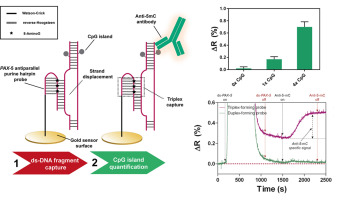
Prof Laura Lechuga, Scientific Director of NANBIOSIS Unit 4 Biodeposition and Biodetection Unit, has led the research whose results have been published by Biosensors and Bioelectronics with the title “Label-free DNA-methylation detection by direct ds-DNA fragment screening using poly-purine hairpins”
Cancer diagnosis continuously evolves due to the better understanding of tumorigenic processes. DNA-methylation is consolidated as an effective biomarker for cancer prognosis and diagnostic even in tumors of unknown origin. The reversibility of this epigenetic mechanism also places it as a high-profile tool for the development of more sophisticated and personalized therapies. Current methodologies, such as bisulfite conversion or PCR amplification, rely on complex procedures that make difficult the standardization of epigenetics analyses. Here we present an optical biosensor methodology based on Surface Plasmon Resonance that employs poly-purine reverse-Hoogsten hairpin probes capable of interacting directly with ds-DNA fragments by triple helix formation. The direct interaction with the material of interest can greatly enhance the reliability of the analysis providing a more accurate and precise diagnosis. We have demonstrated the capabilities of our methodology for the direct capture of ds-DNA fragments and specific methyl-cytosine quantification. Our poly-purine hairpin probe demonstrated the specific capture of ds-DNA fragments while the standard duplex-forming probes failed to do so. In addition, the biosensor methodology showed a strong correlation with the different DNA methylation status
between the sequences with a low signal variation (≤8%CV) along 35 hybridization/regeneration cycles. Through its straightforward procedure and versatility of detecting different DNA modifications related to the DNA methylation process, we anticipate that our strategy will enable a greater level of accuracy and precision in cancer diagnostics making a strong impact on the development of personalized therapies








